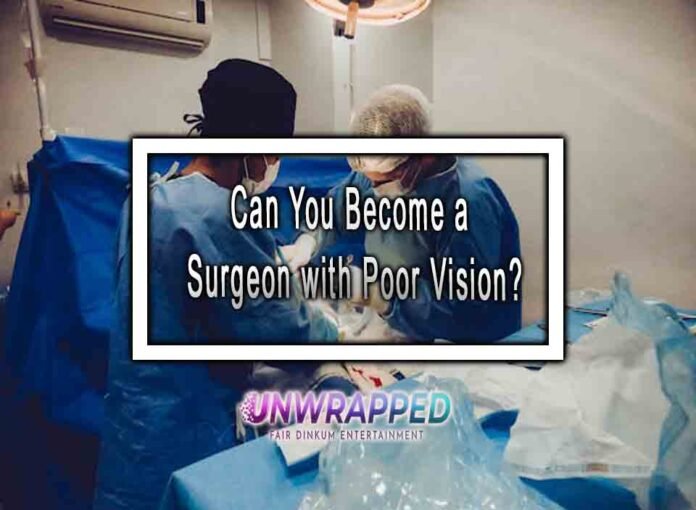Becoming a surgeon is a dream career for many—combining precision, skill, and the ability to change lives in the operating room. But what if your vision isn’t perfect? Could poor eyesight stand between you and the surgical career of your dreams? Let’s explore how vision impacts a surgeon’s journey and whether poor vision is a dealbreaker in the field of surgery.
Page Contents
ToggleVision and Surgery: A Crucial Connection
Clear vision is undeniably important for a surgeon. After all, surgeries often involve intricate, detail-oriented work that demands excellent hand-eye coordination and spatial awareness. However, poor vision doesn’t necessarily mean you’re disqualified from becoming a surgeon. Thanks to modern advancements in technology and medical accommodations, even individuals with vision impairments have found ways to excel in surgery.
Before we dive into the possibilities, let’s look at the key ways vision plays a role in a surgeon’s career.
Why Vision Matters in Surgery
1. Precision in Procedures
Surgeons often operate in millimeters, particularly in delicate specialties like neurosurgery or ophthalmology. Poor vision, if uncorrected, could compromise accuracy and outcomes.
2. Depth Perception
Good depth perception is critical for surgeries that involve multiple layers of tissue or require the use of tools like laparoscopic cameras.
3. Endurance in the Operating Room
Surgeons may spend hours on their feet during a procedure, requiring sustained visual focus without eye strain or fatigue.
4. Team Communication
Surgeons often rely on visual cues to interpret data from monitors, imaging tools, and assistants. Quick visual processing is essential in high-pressure environments.
Can Poor Vision Be Managed?
Here’s the good news: poor vision is not necessarily a barrier to becoming a surgeon, provided you take the right steps to address it. Many surgeons with vision impairments have successfully managed their condition through corrective measures, adaptive tools, and innovative techniques.
1. Corrective Lenses
Wearing glasses or contact lenses can compensate for most common vision issues, such as nearsightedness, farsightedness, and astigmatism. Many surgeons use specially designed eyewear during procedures for optimal clarity and comfort.
2. Laser Eye Surgery
Procedures like LASIK (Laser-Assisted In Situ Keratomileusis) can correct refractive errors, offering a long-term solution for poor vision. While LASIK is not suitable for everyone, it can significantly improve visual acuity for many individuals.
3. Assistive Technology
- Magnification Tools: Surgeons often use loupes or surgical microscopes to magnify the operative field, providing enhanced visibility regardless of natural eyesight.
- Digital Systems: Advanced surgical robotics and augmented reality systems can aid surgeons by providing high-definition visuals and overlayed guidance.
4. Eye Health Maintenance
Regular eye exams, proper lighting, and breaks from screens can help prevent strain and maintain optimal vision for long surgeries.
Specific Challenges and How to Overcome Them
1. Severe Visual Impairments
If your vision issues are more complex, such as partial blindness or significant depth perception problems, certain specialties might be more challenging. For example, micro-surgery or fields requiring extensive 3D visualization may not be ideal. However, fields like pathology, psychiatry, or general practice might offer better fits for individuals with significant vision impairments.
2. Aging and Vision
Surgeons are not immune to the natural aging process, which often leads to presbyopia (difficulty focusing on close objects). Many surgeons address this with progressive lenses or other adaptive technologies to continue practicing effectively.
3. Coping with Eye Strain
Prolonged surgeries can lead to visual fatigue, particularly for those with preexisting vision issues. Strategies to combat this include:
- Using high-quality, anti-reflective lenses.
- Ensuring proper ergonomic setups in the operating room.
- Practicing mindfulness techniques to reduce overall stress and tension.
Inspiring Examples of Surgeons with Vision Challenges
Dr. Paul Tessier
Known as the father of modern craniofacial surgery, Dr. Paul Tessier overcame significant challenges in his career, demonstrating that obstacles—even physical ones—can be surmounted with determination and innovation.
Real-Life Accounts
Many surgeons openly discuss using tools like magnifying loupes or laser-corrected vision to maintain high standards in their practice. Their stories serve as a testament that poor vision is not an insurmountable barrier.
What the Australian Medical Board Says
In Australia, the Australian Health Practitioner Regulation Agency (AHPRA) requires surgeons to demonstrate their ability to practice safely. However, the focus is on functional capacity rather than physical perfection. As long as your vision can be corrected or managed to meet professional standards, poor vision is unlikely to disqualify you.
Tip: Be transparent about any vision impairments during your medical assessments and ensure you comply with AHPRA’s requirements.
How to Prepare for a Surgical Career with Poor Vision
- Get Regular Eye Exams: Stay proactive about your eye health and address any issues early.
- Invest in the Right Tools: From surgical loupes to cutting-edge technology, equip yourself with tools that enhance your vision during procedures.
- Explore Vision Correction Options: Consult an ophthalmologist about whether LASIK or similar procedures could work for you.
- Choose the Right Specialty: If your vision challenges are significant, consider surgical specialties that rely less on fine motor skills or detailed visual work.
Conclusion: Vision Isn’t Everything
While excellent vision is undoubtedly an asset for surgeons, poor vision doesn’t have to hold you back. With the right strategies and support, you can adapt to overcome challenges and thrive in the operating room. Remember, being a great surgeon is about more than just eyesight—it’s about skill, resilience, and a commitment to saving lives.
What’s Your Take?
Have you or someone you know pursued a surgical career despite vision challenges? Share your experiences in the comments below! If you found this article helpful, don’t forget to share it with aspiring surgeons and subscribe for more insightful content.
This blog provides a comprehensive, SEO-optimized guide to a common concern for aspiring surgeons. By blending practical advice with inspiring examples, it offers immense value to readers while being engaging and shareable.
See Also: What Disqualifies You from Becoming a Surgeon in Australia











